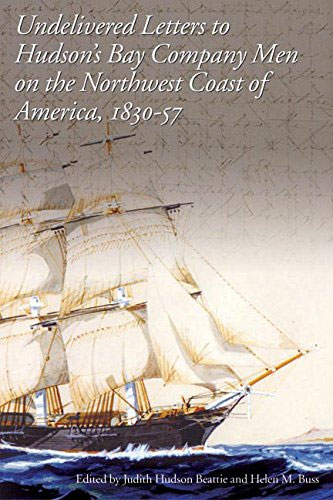 |
Undelivered Letters to Hudson's Bay Company Men on the Northwest Coast of America, 1830-57
|
This Archives, located in downtown Winnipeg, contains a wonderful collection of records relating to the operation of the world’s second-oldest company (founded 1670) during its first 250 years, to 1920. At one time, these records resided at the HBC headquarters in London, England. In 1970, HBC’s head office moved to Canada. Four years later, the company loaned its records (a wide range of items including documents, maps, architectural drawings, photos, and film) to the Archives of Manitoba and they were transported across the Atlantic (in two separate shipments as a precaution against disaster). In 1994, the records were donated officially to Manitoba.
Because the corporate reach of the Hudson’s Bay Company extended all over northern North America, including the west coast, men who worked for the HBC were routinely away from home for periods of years. Loved ones at home would write letters to them but, often, these letters arrived at a remote trading post after the person to whom it was addressed had left for home, after they had died (for a variety of reasons), or after they had left HBC employment for a better job. Consequently, the letter was not delivered and would eventually be returned, unopened, to the HBC office in London. Letters with a return address would be sent there but, often, there wasn’t enough information to do so. These letters were kept in case the writer or recipient came to claim them. The unclaimed letters, covering a period from 1830 to 1857, came back to North America as part of the Hudson’s Bay Company Archives, in 1974.
The earliest ones were one or more sheets of paper folded to form a cover where the name and address were written. The letter would be sealed by a daub of coloured wax. Mail was expensive to send so letter writers would use as few sheets as possible and maximize the space by writing, usually in English and sometimes in French, in small letters or “cross-writing.” That method of writing allows you to put twice as much information on a page. One wrote the letter in the usual way, with lines from left to right over the entire page. Then, the page was turned 90 degrees and more lines were written across the ones already there. It looked terribly confusing but, with a bit of practice, the human brain can readily decipher the cross-written text.
For over a decade, HBCA Archivist Judith Hudson Beattie read and transcribed the letters. In the transcriptions, she sometimes added punctuation that was lacking from the original, that made comprehension easier. She corrected badly misspelled words written by people who were barely literate, and explained words that are no longer in common usage. She organized and discussed the letters, and researched the men to whom they were addressed. As might be imagined, the letters cover a huge spectrum. Most were sent by people in Lower Canada (Quebec), England, Ireland, Wales, and Scotland. They are remarkable at revealing the lives of working-class and lower-middle-class people, especially women, something that usually is absent from the historical record. Common themes related to “concerns about safety, worries about money, and the ability of love and loyalty to survived over time and distance.” There are heart-rending letters from destitute parents hoping to entice a wayward son to return, and women who have been deserted, sometimes with new children they cannot support.
Waterford [Ireland]
January 29th, 1833Dear John,
A short time ago I wrote to Mr. Smith the agent to the Hudson’s Bay Company at his office at Threadneedle Street London to know whether you were living or not or where you were when they last heard and he informed me that you were well and on board on one of their ships at Columbia river – I now write a few lines to tell you of your family.
Your mother sends a letter with this which will also inform you – Your father died last September and your brother Nick also a few days after him of the Cholera Morbus which complaint raged here in Ireland and England this last Summer and Autumn very severely and took away rich and poor without distinction – My father though a healthy man always, also died of it the beginning of last month – Your uncle William Flinn came home from Newfoundland about a year ago and also died last Summer but I believe he did not leave any money to signify after him as he said there was a great deal due to him in Newfoundland which he could not collect or get paid – Therefore in consequence of these deaths your Mother and family are left very desolate and of course unprovided for, and for this reason I wish to write you thinking that perhaps you would soon come home to see us and if so I would do all in my power to get you whatever situation I could here so that you might live here or go in some vessel from this Port – At all events when you receive this letter if you don’t come home I would be glad you would write me or your Mother – I will do what I can for her but I have a great many looking to me since my father died for support and it is hard for me to make out living for all of them – Should you come home We should be glad to see you – In the mean time
I remain
Your friend
Henry Ridgeway[Judith Beattie was able to determine that John Flinn did return to London, England later that year aboard an HBC ship but not if he returned to Ireland to help his destitute mother and family]
Page revised: 24 November 2018